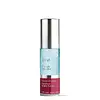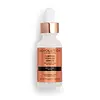What's inside
What's inside
 Key Ingredients
Key Ingredients

 Benefits
Benefits

 Ingredients Side-by-side
Ingredients Side-by-side

Water
Skin ConditioningGlycereth-26
HumectantPolysorbate 20
EmulsifyingN-Prolyl Palmitoyl Tripeptide-56 Acetate
Skin ConditioningAcetyl Hexapeptide-8
HumectantPropanediol
SolventTephrosia Purpurea Seed Extract
Skin ConditioningMalachite Extract
AntioxidantPentylene Glycol
Skin ConditioningXanthan Gum
EmulsifyingDisodium EDTA
Caprylyl Glycol
EmollientSodium Benzoate
MaskingPhenoxyethanol
PreservativeEthylhexylglycerin
Skin ConditioningTocopherol
AntioxidantAcrylates/C10-30 Alkyl Acrylate Crosspolymer
Emulsion StabilisingSodium Hydroxide
BufferingWater, Glycereth-26, Polysorbate 20, N-Prolyl Palmitoyl Tripeptide-56 Acetate, Acetyl Hexapeptide-8, Propanediol, Tephrosia Purpurea Seed Extract, Malachite Extract, Pentylene Glycol, Xanthan Gum, Disodium EDTA, Caprylyl Glycol, Sodium Benzoate, Phenoxyethanol, Ethylhexylglycerin, Tocopherol, Acrylates/C10-30 Alkyl Acrylate Crosspolymer, Sodium Hydroxide
Water
Skin ConditioningPropanediol
SolventGlycerin
HumectantButylene Glycol
HumectantXanthan Gum
EmulsifyingSodium Benzoate
MaskingPotassium Sorbate
PreservativeDisodium EDTA
Carbomer
Emulsion StabilisingPolysorbate 20
EmulsifyingDipeptide Diaminobutyroyl Benzylamide Diacetate
Skin ConditioningCaprylyl Glycol
EmollientBis(Tripeptide-1) Copper Acetate
Skin ConditioningEthylhexylglycerin
Skin ConditioningPalmitoyl Tripeptide-1
Skin ConditioningPalmitoyl Tetrapeptide-7
Skin ConditioningWater, Propanediol, Glycerin, Butylene Glycol, Xanthan Gum, Sodium Benzoate, Potassium Sorbate, Disodium EDTA, Carbomer, Polysorbate 20, Dipeptide Diaminobutyroyl Benzylamide Diacetate, Caprylyl Glycol, Bis(Tripeptide-1) Copper Acetate, Ethylhexylglycerin, Palmitoyl Tripeptide-1, Palmitoyl Tetrapeptide-7
Ingredients Explained
These ingredients are found in both products.
Ingredients higher up in an ingredient list are typically present in a larger amount.
Caprylyl Glycol is a humectant and emollient, meaning it attracts and preserves moisture.
It is a common ingredient in many products, especially those designed to hydrate skin. The primary benefits are retaining moisture, skin softening, and promoting a healthy skin barrier.
Though Caprylyl Glycol is an alcohol derived from fatty acids, it is not the kind that can dry out skin.
This ingredient is also used as a preservative to extend the life of products. It has slight antimicrobial properties.
Learn more about Caprylyl GlycolDisodium EDTA plays a role in making products more stable by aiding other preservatives.
It is a chelating agent, meaning it neutralizes metal ions that may be found in a product.
Disodium EDTA is a salt of edetic acid and is found to be safe in cosmetic ingredients.
Learn more about Disodium EDTAEthylhexylglycerin (we can't pronounce this either) is commonly used as a preservative and skin softener. It is derived from glyceryl.
You might see Ethylhexylglycerin often paired with other preservatives such as phenoxyethanol. Ethylhexylglycerin has been found to increase the effectiveness of these other preservatives.
Polysorbate 20 is made by combining ethoxylation of sorbitan, ethylene oxide, and lauric acid. It is a mild cleansing agent, surfactant, and emulsifier.
As a surfactant, it helps collect dirt and oils for washing. Emulsifiers prevent oils and water from separating.
Polysorbate 20 also adds scent to a product. Since it is made using sorbitol, it has a sweet scent. Sorbitol can also be found in fruits such as apples and peaches.
The lauric acid used to create Polysorbate 20 is often derived from coconuts.
Polysorbate 20 may not be fungal acne safe.
Learn more about Polysorbate 20Propanediol is an all-star ingredient. It softens, hydrates, and smooths the skin.
It’s often used to:
Propanediol is not likely to cause sensitivity and considered safe to use. It is derived from corn or petroleum with a clear color and no scent.
Learn more about PropanediolSodium Benzoate is a preservative. It's used in both cosmetic and food products to inhibit the growth of mold and bacteria. It is typically produced synthetically.
Both the US FDA and EU Health Committee have approved the use of sodium benzoate. In the US, levels of 0.1% (of the total product) are allowed.
Sodium benzoate works as a preservative by inhibiting the growth of bacteria inside of cells. It prevents the cell from fermenting a type of sugar using an enzyme called phosphofructokinase.
It is the salt of benzoic acid. Foods containing sodium benzoate include soda, salad dressings, condiments, fruit juices, wines, and snack foods.
Studies for using ascorbic acid and sodium benzoate in cosmetics are lacking, especially in skincare routines with multiple steps.
We always recommend speaking with a professional, such as a dermatologist, if you have any concerns.
Learn more about Sodium BenzoateWater. It's the most common cosmetic ingredient of all. You'll usually see it at the top of ingredient lists, meaning that it makes up the largest part of the product.
So why is it so popular? Water most often acts as a solvent - this means that it helps dissolve other ingredients into the formulation.
You'll also recognize water as that liquid we all need to stay alive. If you see this, drink a glass of water. Stay hydrated!
Learn more about WaterXanthan gum is used as a stabilizer and thickener within cosmetic products. It helps give products a sticky, thick feeling - preventing them from being too runny.
On the technical side of things, xanthan gum is a polysaccharide - a combination consisting of multiple sugar molecules bonded together.
Xanthan gum is a pretty common and great ingredient. It is a natural, non-toxic, non-irritating ingredient that is also commonly used in food products.
Learn more about Xanthan Gum